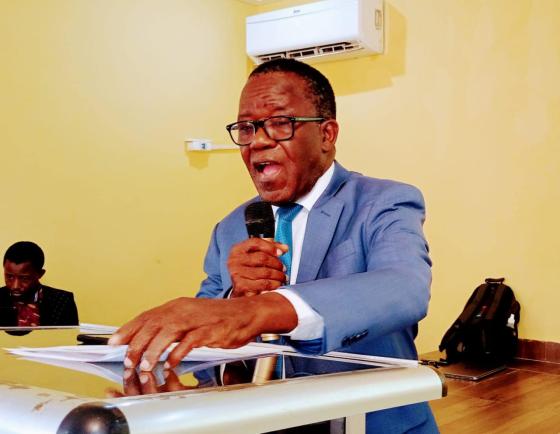Liberia: Gov’t Craves Robust ESIA Processes across Liberia

EPA Executive Director, Prof. Wilson Tarpeh.
....Trains 130 independent inspectors in impacts assessment and licensing procedures
The Environmental Protection Agency of Liberia (EPA) has convened an intensive two-week Environmental and Social Impact Assessment (ESIA) licensure training for 130 independent evaluators, project developers, and technicians.
Known as the ESIA Licensure training, the exercise, which began on Monday, February 21, 2022, brings together inspectors who were drawn from the environmental units of line ministries, agencies, and commissions of the government to appropriately carry out ESIA.
The initiative is the 8th edition of the Licensure Training and is intended to renew the licenses of all current third-party independent evaluators, certify new evaluators, and also certified technicians of government ministries, agencies, and commissions as well as proponents.
“This training is intended to enhance your capacities. We have to make ESIA a priority across this country,” said EPA Executive Director, Prof. Wilson Tarpeh.
This is the first and one of the most important activities and processes that are expressly written in the Environmental Protection and Management Law of Liberia (EP&ML-L) since Prof. Tarpeh took over the affairs of the Agency.
Section 1 of the law provides the legal framework for the sustainable development, management, and protection of the environment by the EPA.
Additionally, Section 10, Part III of said Law also mandates the agency that any proposed project that may have a significant impact on the environment, should develop and implement regulations establishing the procedures for evaluating the impact of the proposed project, which shall include: “A description of the format and procedures to be followed in the preparation of all required documents, procedures and guidelines for reviewing the qualification of professionals who shall be authorized to prepare environmental reviews, studies, statements, and audits required under the Law and maintain a Registry of the names and qualifications of approved consultants from which the Agency, in consultation with the Line Ministry, shall authorize a consultant to prepare an environmental impact study.”
Prof. Tarpeh urged the participants to remain focused during the training as participants would be assessed at the end of the two-week training before they are certified by the EPA. “As we go through this training, we want you to give all of your attention as you can,” Prof. Tarpeh said.
In support, the EPA Deputy Director, Randall Dobayou, II, added that the training also seeks to certify proponents wishing to conduct their environmental monitoring reports for their projects.
Dobayou said that the licenses of firms expired on June 30, 2021, and disclosed that the EPA could not conduct training because of the health restrictions on large gatherings due to the COVID 19.
Giving the overview of the training, John K. Jallah, Assistant Manager for Compliance and Enforcement at the EPA, said that the training is necessary since there are emerging environmental issues to which consultants may have limited knowledge. Manager Jallah lamented that the training will address challenges in the reporting format of some consultants, which have led to a delay in the permit issuance process of proponents.
“The training will provide a uniform reporting format and improve the capacity of the EPA-certified environmental firms to adequately screen various emerging projects and address all potential impacts associated with these projects,” he said.
He encouraged project developers or proponents and environmental safeguard specialists of projects and programs at different ministries of government and those in the private sector to take advantage of the training. He believes by doing so will help their operations to be compliant with the environmental laws and regulations of Liberia.
“Proponents and project developers who satisfactorily complete the training shall be certified to conduct and subsequently submit their environmental monitoring reports through their environmental units or departments, except that all laboratory environmental quality data in said reports are to be sampled and analyzed by an EPA’s third-party accredited laboratory before complete acceptance by the EPA,” he added.
The training is expected to climax with a site visit (practical exercises) by the participants, based on their respective assignments.
